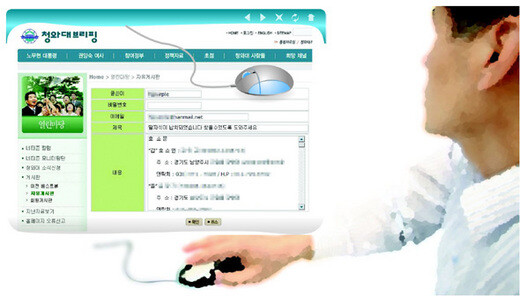hankyoreh
Links to other country sites 다른 나라 사이트 링크
Information leaks at public institutions uncovered

Personal records from workers at South Korea’s public institutions are available online through the search engine Google. If left uncorrected, there is potential for serious damage to the individuals whose information has been left unprotected, as the online records include not only basic information such as their resident registration numbers and addresses, but also tax and financial information.
A survey performed by the Hankyoreh with help from a security expert on January 28 confirmed more than 5,400 such cases. The information leakage was discovered at the Web sites of 452 public institutions, including the presidential office, central government agencies, the legislature and the judiciary, local governments, schools, and medical institutions.
If one knows the birthday of someone working at a public institution and the domain address of the Internet site of the concerned institution, one can easily access individual records through Google, as the first six digits of the national registration number is a person’s birthdate. In addition, as several people in one institution may share a birthdate, the same six digits may unlock at once the private information available to several people.
There are two kinds of data being leaked. The first are resident registration numbers and addresses posted on bulletin boards of public institutions. The second are individual records contained in internal documents of public institutions, which are supposed to be closed to the general public.
Even more alarming, for information on bulletin boards, people can also alter the records of others by entering the site using a "writer" mode or "user" mode. The presidential office and a regional office in Daejeon are good examples of public institutions whose bulletin boards are vulnerable to third party tampering via a "user" mode. Internal documents of public institutions can be downloaded through this same mode.
Most seriously, by using the first six digits of a public employee’s resident registration number, anyone can potentially access sensitive or confidential documents available to that person, even without using illegal means such as hacking or introducing viral spyware. In particular, at the Web site of the Ministry of Government Administration and Home Affairs, which is in charge of individual records from all public institutions, documents supposedly accessible using only the ID and password of related government employees were searched using just the first six digits of a government employee’s resident registration number. So far, 173 such cases have been confirmed. In addition, a list of about 500 job seekers was exposed via the Internet site of the Ministry of Labor’s employment security network.
"Such an occurrence is due to Google’s search technology meeting Korea’s individual information management system under the special circumstance of this country’s resident registration number system," said lawyer Kim Gi-jung. "It is necessary to perform an overall review of the nation’s information management system. Such exposures themselves are a problem, but it is doubtful whether Google, which is not incorporated in Korea, can swiftly cope with the matter," added the lawyer.
Please direct questions or comments to [englishhani@hani.co.kr]
Editorial・opinion
![[Column] Season 2 of special prosecutor probe may be coming to Korea soon [Column] Season 2 of special prosecutor probe may be coming to Korea soon](https://flexible.img.hani.co.kr/flexible/normal/500/300/imgdb/original/2024/0426/3317141030699447.jpg) [Column] Season 2 of special prosecutor probe may be coming to Korea soon
[Column] Season 2 of special prosecutor probe may be coming to Korea soon![[Column] Park Geun-hye déjà vu in Yoon Suk-yeol [Column] Park Geun-hye déjà vu in Yoon Suk-yeol](https://flexible.img.hani.co.kr/flexible/normal/500/300/imgdb/original/2024/0424/651713945113788.jpg) [Column] Park Geun-hye déjà vu in Yoon Suk-yeol
[Column] Park Geun-hye déjà vu in Yoon Suk-yeol- [Editorial] New weight of N. Korea’s nuclear threats makes dialogue all the more urgent
- [Guest essay] The real reason Korea’s new right wants to dub Rhee a founding father
- [Column] ‘Choson’: Is it time we start referring to N. Korea in its own terms?
- [Editorial] Japan’s rewriting of history with Korea has gone too far
- [Column] The president’s questionable capacity for dialogue
- [Column] Are chaebol firms just pizza pies for families to divvy up as they please?
- [Column] Has Korea, too, crossed the Rubicon on China?
- [Correspondent’s column] In Japan’s alliance with US, echoes of its past alliances with UK
Most viewed articles
- 1AI is catching up with humans at a ‘shocking’ rate
- 2‘We must say no’: Seoul defense chief on Korean, USFK involvement in hypothetical Taiwan crisis
- 3Korea sees more deaths than births for 52nd consecutive month in February
- 4[Column] Season 2 of special prosecutor probe may be coming to Korea soon
- 5[Editorial] Korea’s surprise Q1 growth requires objective assessment, not blind fanfare
- 6[Guest essay] The real reason Korea’s new right wants to dub Rhee a founding father
- 7Is N. Korea threatening to test nukes in response to possible new US-led sanctions body?
- 8Division commander ordered troops to enter raging flood waters before Marine died, survivor says
- 9Is Japan about to snatch control of Line messenger from Korea’s Naver?
- 10Park administration’s distorted history textbooks made public